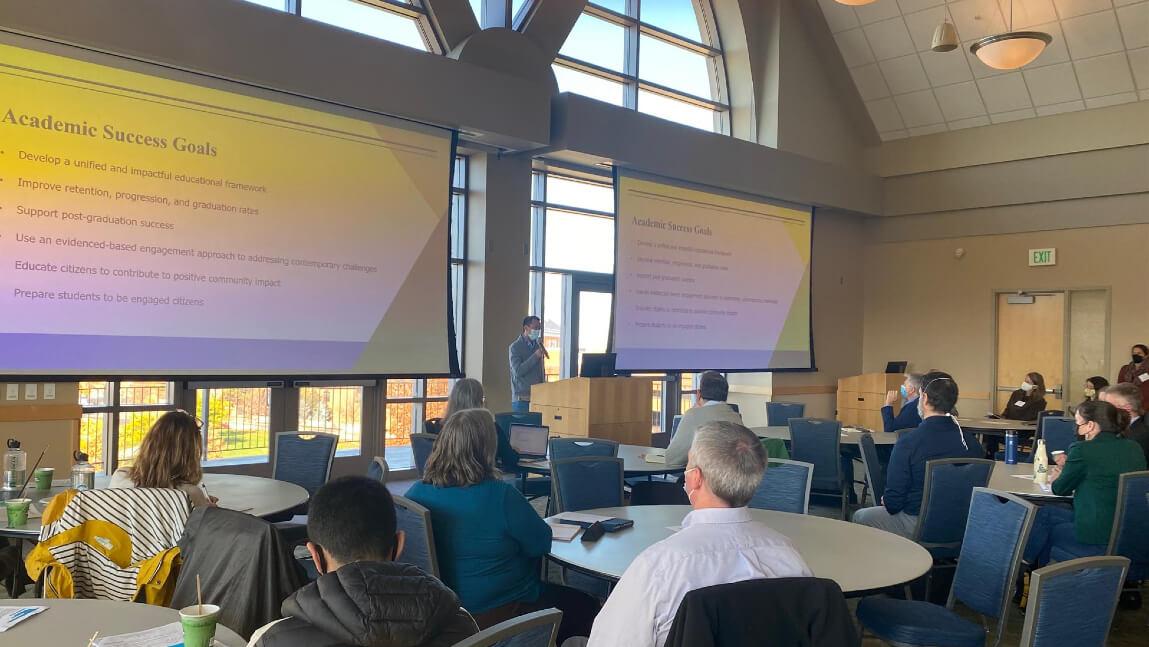The University of Vermont Office of Engagement drew 60 campus leaders for the first ever Experiential Learning Summit at the Davis Center yesterday. The morning-long event attracted staff and faculty who offer undergraduate students opportunities for self-discovery and real-world experience through independent research, internships, service learning projects, study abroad and short-term employment.
Office of Engagement Director Chris Koliba said the summit was the first time faculty and staff with some role in experiential learning had come together in one place.
“This is the first of several meetings we’ll have in the coming months, “ he said. “The objective is not to centralize all operations connected to experiential learning on campus, but to coordinate our efforts.”
Provost Patricia Prelock applauded attendees for the high quality programs already being offered.
“I think it’s really important to know that we’re doubling down on our commitment to prepare students for life beyond UVM and what better way to do that than through experiential learning and internship opportunities,” she said.
President Suresh Garimella encouraged the audience to use a broad definition of “internships” to include a variety of experiences outside the classroom which broaden student perspectives and hone career preparation.
“I really, really believe in internships—and by internships I mean any experiential learning opportunity,” he said.
He noted that surveys consistently show the availability of meaningful internships is one of the top factors students are looking for in making their college choice.
“We’re starting in a good place,” he said. “UVM is actually quite good at this. You know that 70% of our students graduate after doing an internship.”
Garimella outlined his goal in having all graduates have one—and hopefully more than one—learning experience without extending the time it takes to earn a degree. He also outlined the importance of student preparedness given Vermont’s aging population and the urgent need for new workers.
“UVM introduces 1000 students into the workforce every year—and over 500 of them are from out of state. How do we enhance this? It’s not just helping students connect with internships it’s also about educating employers about how to use the resources we have to offer.”
Representatives involved in some aspect of experiential learning made brief presentations including spokespersons for the UVM Career Center; the Community-Engaged Learning Office (CELO); the Fellowships, Opportunities, and Undergraduate Research (FOUR) office; and internship programs from UVM colleges of Arts and Sciences, Engineering, Agriculture and Life Sciences, the Rubenstein School, and Nursing and Health Sciences.
Participants then joined small group discussions to share opportunities and challenges in future collaboration. The groups, moderated by Office of Engagement staff, included skills acquisition, academic learning, communications and tracking of memorandums of understanding (MOU’s), contracts offered by local employers that might be sources of experiential learning opportunities for UVM students.
Koliba and Pam Gardner, director of career services, gave a joint presentation that outlined gaps between student aspirations and actual achievement.
“Students are looking for experiential opportunities but not always getting connected to those opportunities. Ninety percent of incoming students say they want an internship at some point in their college career but only 70% end up doing one,” Koliba said.
He stressed the importance of equitable access to internships, and the institutional commitment to fund opportunities that are difficult for many students to afford. He also outlined the measures the Office of Engagement is taking to expand outreach to employers throughout the state and raise awareness of UVM as a source for motivated, skilled students looking for opportunity.
In his closing remarks, Koliba reminded the audience that experiential learning is part of the DNA of the university.
“Probably our most famous alum, philosopher John Dewey, showed the importance of experiential learning in the curriculum,” he said. “We should own that.”
